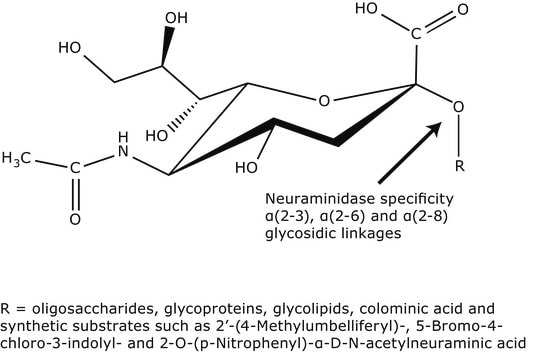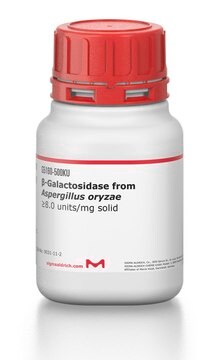OP03L
Anti-p53 (Ab-1) (Pantropic) Mouse mAb (PAb421)
lyophilized, clone PAb421, Calbiochem®
Sign Into View Organizational & Contract Pricing
All Photos(1)
About This Item
UNSPSC Code:
12352203
NACRES:
NA.43
Recommended Products
biological source
mouse
Quality Level
antibody form
purified antibody
antibody product type
primary antibodies
clone
PAb421, monoclonal
form
lyophilized
does not contain
preservative
species reactivity
human, monkey, mouse, rabbit, rat
manufacturer/tradename
Calbiochem®
storage condition
OK to freeze
isotype
IgG2a
shipped in
ambient
storage temp.
2-8°C
target post-translational modification
unmodified
Gene Information
human ... TP53(7157)
General description
Purified mouse monoclonal antibody, originally called clone L21, generated by immunizing mice with the specified immunogen and fusing splenocytes with NS1 mouse myeloma cells (see application references). Recognizes the ~53 kDa wild-type and mutant forms of p53.
Recognizes the ~53 kDa mammalian wild-type and mutant p53 protein. Does not recognize phosphorylated p53.
This Anti-p53 (Ab-1) (Pantropic) Mouse mAb (PAb421) is validated for use in Frozen Sections, Gel Shift, Immunoblotting, IF, FC, IP for the detection of p53 (Ab-1) (Pantropic).
Immunogen
Epitope: within amino acids 376-378 of human p53
Mouse
partially purified mouse p53
Application
Frozen Sections (10 µg/ml, see application references)
Gel Shift (see comments)
Immunoblotting (10 µg/ml, see application references)
Immunofluorescence (1-20 µg/ml, see application references)
Flow Cytometry (1-20 µg/ml)
Immunoprecipitation (1 µg per sample, see application references)
Gel Shift (see comments)
Immunoblotting (10 µg/ml, see application references)
Immunofluorescence (1-20 µg/ml, see application references)
Flow Cytometry (1-20 µg/ml)
Immunoprecipitation (1 µg per sample, see application references)
Warning
Toxicity: Standard Handling (A)
Physical form
Lyophilized from a volatile buffer, 100 µg BSA.
Reconstitution
Reconstitute the lyophilized antibody with sterile PBS, pH 7.4, or sterile 20 mM Tris-saline (20 mM Tris containing 0.15 M NaCl), pH 7.4, to yield a final concentration of 100 µg/ml. Lyophilized antibody should be resuspended at 4°C with occasional gentle mixing for at least 2 h. Store at 4°C until reconstituted, then store in aliquots at -20°C or at 4°C with 0.1% azide; freezing of aliquots is best for long-term storage of reconstituted product, but repetitive freezing and thawing should be avoided.
Analysis Note
Negative Control
Normal skin tissue or SK-OV-3 cells
Normal skin tissue or SK-OV-3 cells
Positive Control
Breast carcinoma, A431 cells, or p53 standard (Cat. No. 506147)
Breast carcinoma, A431 cells, or p53 standard (Cat. No. 506147)
Other Notes
El-Deiry, W.S., et al. 1994. Cancer Res.54, 1169.
Greenblatt, M.S., et al. 1994. Cancer Res.54, 4855.
Legros, Y., et al. 1994. Oncogene9, 2071.
Barak, Y., et al. 1993. EMBO J.12, 461.
Kuerbitz, S.J. 1992. Proc. Natl. Acad. Sci. USA89, 7491.
Kastan, M.B., et al. 1992. Cell71, 587.
Lane, D.P. 1992. Nature358, 15.
Kastan, M.B., et al. 1991. Cancer Res.51 6304.
Crawford, L. and Harlow, E. 1982. J. Virol.41, 709.
Harlow, E., et al. 1981. J. Virol.39 861.
Greenblatt, M.S., et al. 1994. Cancer Res.54, 4855.
Legros, Y., et al. 1994. Oncogene9, 2071.
Barak, Y., et al. 1993. EMBO J.12, 461.
Kuerbitz, S.J. 1992. Proc. Natl. Acad. Sci. USA89, 7491.
Kastan, M.B., et al. 1992. Cell71, 587.
Lane, D.P. 1992. Nature358, 15.
Kastan, M.B., et al. 1991. Cancer Res.51 6304.
Crawford, L. and Harlow, E. 1982. J. Virol.41, 709.
Harlow, E., et al. 1981. J. Virol.39 861.
Originally called clone L21. Does not recognize phosphorylated or acetylated p53. For a gel shift assay, resuspend in 100 µl buffer. Wild-type p53 has a short half-life and is present in low amounts in cells. For immunoprecipitation, increasing the amount of sample to be immunoprecipitated and applied to the gel may help visualize wild-type p53, and short incubation times with 35S-Met (≤1 h) will help reduce background. For immunoblotting wild-type p53, maximize sensitivity by concentrating samples by immunoprecipitation with Cat. No. OP03, then perform immunoblotting using Cat. No. PC35 and chemiluminescent detection. Antibody should be titrated for optimal results in individual systems.
Legal Information
CALBIOCHEM is a registered trademark of Merck KGaA, Darmstadt, Germany
Not finding the right product?
Try our Product Selector Tool.
Storage Class Code
11 - Combustible Solids
WGK
WGK 1
Certificates of Analysis (COA)
Search for Certificates of Analysis (COA) by entering the products Lot/Batch Number. Lot and Batch Numbers can be found on a product’s label following the words ‘Lot’ or ‘Batch’.
Already Own This Product?
Find documentation for the products that you have recently purchased in the Document Library.
Our team of scientists has experience in all areas of research including Life Science, Material Science, Chemical Synthesis, Chromatography, Analytical and many others.
Contact Technical Service





